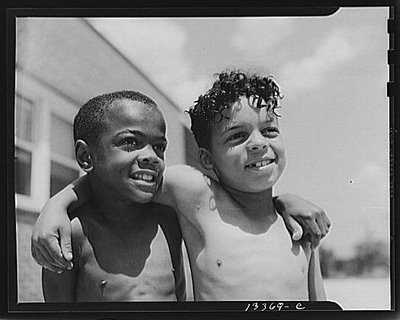Gordon Parks, 1912-2006





A busy couple of weeks at work means no blog posts. It also means some major news slips through the cracks, like the passing of Gordon Parks. Excerpts from the Associated Press article:
Gordon Parks, who captured the struggles and triumphs of black America as a photographer for Life magazine and then became Hollywood's first major black director with "The Learning Tree" and the hit "Shaft," died Tuesday...He was 93.
"Nothing came easy," Parks wrote in his autobiography. "I was just born with a need to explore every tool shop of my mind, and with long searching and hard work. I became devoted to my restlessness."
He covered everything from fashion to politics to sports during his 20 years at Life, from 1948 to 1968. But as a photographer, he was perhaps best known for his gritty photo essays on the grinding effects of poverty in the United States and abroad and on the spirit of the civil rights movement. "Those special problems spawned by poverty and crime touched me more, and I dug into them with more enthusiasm," he said. "Working at them again revealed the superiority of the camera to explore the dilemmas they posed."
Parks went through a series of jobs as a teen and young man, including piano player and railroad dining car waiter. The breakthrough came when he was about 25, when he bought a used camera in a pawn shop for $7.50. He became a freelance fashion photographer, went on to Vogue magazine and then to Life in 1948. "Reflecting now, I realize that, even within the limits of my childhood vision, I was on a search for pride, meanwhile taking measurable glimpses of how certain blacks, who were fed up with racism, rebelled against it," he wrote.
"I dream terrible dreams, terribly violent dreams," he said. "The doctors say it's because I suppressed so much anger and hatred from my youth. I bottled it up and used it constructively." In his autobiography, he recalled that being Life's only black photographer put him in a peculiar position when he set out to cover the civil rights movement."Life magazine was eager to penetrate their ranks for stories, but the black movement thought of Life as just another white establishment out of tune with their cause," he wrote. He said his aim was to become "an objective reporter, but one with a subjective heart."
Life's managing editor, Bill Shapiro, said in a statement Tuesday that it had "lost one of its dearest members.""Gordon was one of the magazine's most accomplished shooters and one of the very greatest American photographers of the 20th century," the statement said. "He moved as easily among the glamorous figures of Hollywood and Paris as he did among the poor in Brazil and the powerful in Washington."

0 Comments:
Post a Comment
<< Home